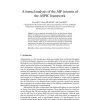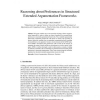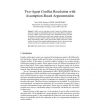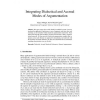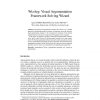124
click to vote
ICAIL
2011
ACM
14 years 1 months ago
2011
ACM
We study the formal relationships between the inferential aspects of Carneades (a general argumentation framework) and Defeasible Logic. The outcome of the investigation is that t...
174
click to vote
AIL
2011
14 years 2 months ago
2011
Argumentation is the process by which arguments are constructed and handled. Argumentation constitutes a major component of human intelligence. The ability to engage in argumentat...
206
click to vote
COMMA
2010
14 years 9 months ago
2010
This paper addresses the problem of revising a Dung-style argumentation framework by adding finitely many new arguments which may interact with old ones. We study the behavior of t...
129
click to vote
COMMA
2010
14 years 9 months ago
2010
In order to support the interchange of ideas and data between different projects and applications in the area of computational argumentation, a common ontology for computational ar...
137
click to vote
COMMA
2010
14 years 9 months ago
2010
Abstract. This paper combines two recent extensions of Dung's abstract argumenrameworks in order to define an abstract formalism for reasoning about preferences in structured ...
141
click to vote
COMMA
2010
14 years 9 months ago
2010
Conflicts exist in multi-agent systems. Agents have different interests and desires. Agents also hold different beliefs and may make different assumptions. To resolve conflicts, ag...
144
click to vote
COMMA
2010
14 years 9 months ago
2010
Abstract. This paper argues that accrual should be modelled in terms of reasoning about the application of preferences to sets of arguments, and shows how such reasoning can be for...
129
click to vote
COMMA
2010
14 years 9 months ago
2010
Argumentative discussions are common in Web 2.0 applications, but the social Web still offers limited or no explicit support for argumentation. As Web 2.0 applications become more ...
143
click to vote
CCIA
2010
Springer
14 years 9 months ago
2010
Springer
Extension-based argumentation semantics have shown to be a suitable approach for performing practical reasoning. An important concern in extensionbased-argumentation semantics is t...
154
click to vote
CORR
2010
Springer
14 years 11 months ago
2010
Springer
This research applies ideas from argumentation theory in the context of semantic wikis, aiming to provide support for structured-large scale argumentation between human agents. The...

